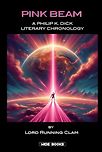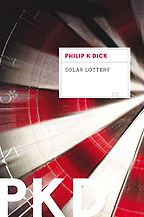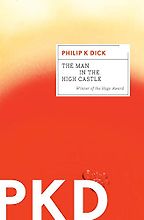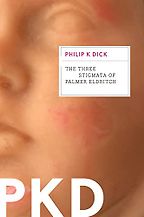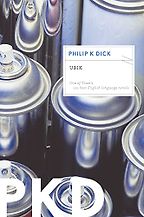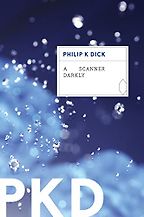Philip K. Dick is one of the most famous sci fi writers – could you introduce us to him?
Philip K. Dick was an American science fiction writer. He was born in Chicago, when his family was on the way from Washington D.C., in 1928. He was a twin; he had a twin sister, and they both weighed just a few pounds each. It so happened that on the way out to California, Phil’s sister died, aged about six weeks. They buried her in Fort Morgan, Colorado where they had family, and they moved on to California where they settled; Phil lived most of his life in Berkeley. When he finally passed away in 1982, he was buried next to his sister in Fort Morgan, in a twin grave.
We go there when we can to have a little gathering of fans, there in Fort Morgan – the one coming up this June, June 13th to 16th 2024, is the third one we’ve had here – the fourth in Colorado. We have scholars and fans coming in from all over the world, and a whole contingent coming in from California, of course, where his headquarters is.
He started writing seriously in about 1951. He wanted to write literary novels. His first novel was called Gather Yourselves Together, and it’s thick and heavy, and hard reading. It was rejected by all the publishers. But he found that he could sell his short stories to science fiction magazines. There was a guy in California, Tony Boucher, the publisher of Fantasy and Science Fiction magazine, and Phil met with him and they got to be friends. He submitted a short story to F&SF, and this was accepted. So, he started writing short stories and sending them out all over, on his own without an agent.
About the middle of 1952, in July, he decided he was a successful science fiction writer, having sold about twenty short-stories already, and he contacted the Scott Meredith Literary agency in New York City. They took him on as a client. Phil wanted the Scott Meredith to market his novels, the ones he couldn’t sell. But they wanted to market his literary novels and his short stories. He sent mainstream novels to Scott Meredith over the next several years, five or six of them, and they were rejected by every publisher – they’d send them out and get them back and send them out again, it just went on. But every science fiction short story he sent in was sold by the agency and published. From 1952, he had about 75 stories published until the middle of 1954, when he wrote his first science fiction novel.
And that was Solar Lottery, the first of five books by Philip K. Dick that you have chosen to recommend. Could you introduce us?
Yes, it was Solar Lottery, called World of Chance in the UK. It’s a complicated novel; he was influenced by Balzac and all these French guys, writing complicated novels with dozens of characters. So he wrote a whole load of characters and made it real complicated, and of course his agent made him throw most of them out. As well as the French realists, he was heavily influenced by another science fiction writer named A. E. Van Vogt, and Solar Lottery shows this influence. He sold the story to Ace Books, and it was published in 1955 as one half of an Ace Double – there was another novel with it, if you turned it upside down.
It’s set in an industrialised environment where the huge corporations are pretty much in charge, and they hire people in a sort of feudal industrial system. The hero, a guy named Ted Bentley, he gets fired from his job at one of these places; so he goes to the person called the ‘Quizmaster’ and signs up with him. The whole society is based on a random lottery: if your number gets picked in this mechanism called ‘the bottle’ you get to be the new Quizmaster. The current Quizmaster knows that the bottle is about to pick a new person, and he doesn’t want to give up power, but of course he has to cede it. He gives Bentley a job in his organisation, whose new mission is to assassinate the new Quizmaster. Now, by law he can attempt to assassinate the new Quizmaster, sending one assassin at a time; but every Quizmaster has a corps of telepathic security agents, the Teeps, to provide protection. So, then, how do you get an assassin through to murder him? It’s a question science fiction has looked at before. Alfred Bester’s The Demolished Man is the same thing: how do you murder somebody who is telepathic? But Bester has a completely different solution to Philip K. Dick’s. The Demolished Man is another influence on Solar Lottery.
It’s an action story, very exciting. And as a subplot, there’s a bunch of ordinary working stiffs, and they’ve got a leader who says there’s a tenth planet on the other side of the Sun called the ‘Flame Disc,’ and they’re building up a spaceship in secret to go and find this tenth planet. It’s really got nothing to do with the main plot! But it’s an interesting subplot. So you’ve got a lot of stuff in this novel. It certainly grabs your attention. Even though it was derivative in some ways of previous writings, it’s very much a Philip K. Dick take on an old science fiction twist.
Do we see things here that we’ll see in later Philip K. Dick novels?
To some degree, yes. He wrote a lot of science fiction novels, he wrote very fast. He was on amphetamines a lot of the time. One of his early novels, Eye in the Sky, is the one that that I read which blew my mind and turned me on to Philip K. Dick back in 1984… I was working in a factory, I’m an electrician, and this book was lying around towards midnight at the end of my shift. I picked this thing up and started reading it; midnight came, I went home and I read on into the night, and I finished it about three or four in the morning. The walls of my room had disappeared, you know, I had no idea what reality was! And this is his main theme: what is reality? I had no clue!
You know, some people don’t like Dick, but if it hits you, you’re hooked: you go out the next day and buy everything you can find. That’s exactly what I did, and what a lot of his fans did. He wrote fast then because he wasn’t making much money, even though he switched to novels. Instead of $50 for a short story, he’s now making $1500 or $2,000 for a novel – which wasn’t bad back in the 1960s, but still not enough to live on. So he speed-wrote a lot of novels, and he was still trying to get his literary novels out there too. In 1961 he was living with his third wife in California, up in Marin County, north of San Francisco. She became a famous jewellery maker, her name was Anne Dick, and he was helping with her jewellery business and feeling very morose. He rented a little hut up the road, about a mile or so from his house, and he lugged his typewriter over there. He thought, he’d better write something, or he’d be polishing jewellery forever. So he started writing, and he had one word which he wrote down on a piece of paper: Mr Tagomi. And Mr Tagomi was the main character in his next novel.
And this was the novel that won him the Hugo and put him on the map, right? The Man in the High Castle.
Exactly. This is the one he wrote out of desperation, and it’s his first masterpiece. I’m sure many of your readers are familiar with it. Whenever I run into old-time fans, they always remember The Man In The High Castle.
It’s set mostly in California. The world has been conquered by the Japanese and the Nazis, World War Two was lost by the Allies. They occupy the United States: the Germans have the eastern part, and the Japanese have the western part, the Pacific coast and all that. And in the middle in the Rocky Mountains is a buffer zone, and a lot of the action takes place there.
There’s machinations and plots… It’s not like the series they had on Netflix, which did not do him justice – I couldn’t make my way to the end of it. It was so fundamentally against what Philip K. Dick was writing! He’s dealing with a form of racism that went on when he wrote in in the 1950s and 60s, racism here in America; but now instead of black people and minorities, the white people are the minority in the novel. This is distorted in the series on Netflix – there is no organised anti-Japanese or anti-Nazi resistance in the novel, which is where the series is flawed. That’s all fabricated.
“He wrote a lot of science fiction novels, and he wrote very fast. He was on amphetamines a lot of the time”
Phil is playing with reality in a very subtle way. There’s a novel within the novel – written by one of the characters, ‘the man in the high castle’ – where the actual truth of the matter is revealed, that the Allies won the war. So there’s the search for this man up in the high castle, up in the Rocky Mountains somewhere.
Mr. Tagomi, the main character, is a Japanese functionary – a minor functionary in the trade mission in San Francisco. He’s trying to keep the Nazis at bay – because the Nazis are secretly trying to decide, do we really want to want to coexist with Japanese, or should we just wipe them out? Operation Dandelion. So Mr. Tagomi, one day, he’s weighed down by all these plots and machinations; and he gets a piece of jewellery made by one of the local American artisans. He’s looking at it, this blob of shiny metal, and all of a sudden he finds himself transformed into what may be our universe – where the allies won the war. He’s freaked out! He’s happy to scuttle back to his comfortable reality…
To get into PKD you have to read The Man In The High Castle, there’s a reason it won the Hugo Award back in 1962.
The existence of alternate realities is a theme in Philip K. Dick’s books. This wasn’t just fiction for him, was it? He took pretty seriously the idea that we don’t understand the nature of our own reality…
Let’s put it this way: he’s a science fiction writer, he makes things up. Alternate reality is not anything he came up with, it’s an old science fiction trope. But he certainly looked at it differently. The novel I mentioned earlier, Eye in the Sky, is all about alternate universes. There’s so many novels I could recommend, I didn’t pick this one I but I should have! In Eye in the Sky there’s a bunch of people visiting the Bevatron, which is a particle accelerator. They’re all watching this thing in operation and it blows up, and they all fall down – and then they wake up, and they’re in an alternate universe. They don’t know that they’re in an alternate universe, because it’s real weird; but it turns out that there’s not just one alternate universe, there’s a succession of alternate universes. The first universe they wake up in is in the worldview of this religious nut, who’s one of the people who was in the accident. You’ve got things like, if you take the Lord’s name in vain, a bee will come out and sting you; and if you look up at the heavens the Eye of God is looking down at them – and they’ve got this umbrella, and they’re floating up to the Eye of God and it burns the umbrella and they fall to the ground – it’s totally nuts. And that’s just the first alternative reality! When they finally figure that one out they’re into another one, and this goes on for four or five different realities, getting shorter and shorter as we get towards the end of the book. So when you finish the book you look up and… what is reality? You don’t know! Am I in somebody else’s personal reality, is everybody in my personal reality? Welcome to the worlds of Philip K. Dick! The Man in the High Castle is not so exuberant. It’s much more of a serious novel than Eye in the Sky.
And there’s similar themes again in your next book recommendation, The Three Stigmata of Palmer Eldritch…
This was written in the early 1960s. After The Man in the High Castle, he thought: I’m a successful writer, maybe now I can sell my straight novels and my mainstream novels? But no, they didn’t go anywhere! He’d made a literary breakthrough with The Man in the High Castle, which wasn’t strictly science fiction, although it wasn’t mainstream – it was a sort of a hybrid. His next novel, We Can Build You, was science fiction. It wasn’t what he wanted to produce. So, he sold that, and then he had to reevaluate his writing.
He said, ‘Well, I can’t sell my literary novels. I have to make some money. I’m just going to concentrate on science fiction.’ This is 1962, ’63, ’64, on into 1970 or so. He cranked out three novels a year – that’s a lot of writing, a lot of speed.
So then comes The Three Stigmata of Palmer Eldritch, and many consider it one of his greatest masterpieces. I told you he was going to his little hut up the road where he’d go type, and he’d call this ‘the hovel’… One day he was walking from his house to his hovel to work on something – or just to sit around smoking pot, I don’t know – when he looked up in the sky and he saw a vision of a metallic mask glaring down at him, and there was a face of pure evil. And he went on shortly after that to write The Three Stigmata of Palmer Eldritch.
How do you explain this book? It’s science fiction, but it’s a horror story at the same time. Mankind has sent a lot of people to Mars as colonists, but it’s a pretty sorry state of affairs on Mars. They live in hovels. They’ve got all this machinery and stuff to terraform the planet, but it’s just sitting there idle and going to rust, nobody’s bothered with it. The characters in the hovels on Mars are all intent on playing this board game. By the use of a drug they take called Can-D, they enter into something like a Barbie doll game – it translates them into this Barbie doll world, and they can have all these affairs with their fellow colonists that they wouldn’t normally have in the real world.
And then a new drug comes on the market to oppose Can-D: it’s called Chew-Z. Chew-Z is a drug made by Palmer Eldritch, who is a man who went out into space and came back many years later. He doesn’t look like you or me: he’s got a metal face, and a metal hand, and his eyes are sort of like a band across his face. He’s come back with this alien Chew-Z drug that he wants to introduce to Mars, to supplant Can-D. And he does it, but the trouble is this is about the worst possible drug you could possibly imagine. It’s horrible: if you take one hit, it’s not a matter of becoming addicted, it’s a matter of no longer even knowing where you are. You’re in Palmer Eldritch’s world now, and you will never ever come out of it. There’s a gripping realisation halfway through that Palmer Eldritch is not human. This is an alien invasion, with an alien drug – oh, crikey.
So then you have one of Philip K. Dick’s ordinary common-man heroes, just a regular working stiff. He has to battle Palmer Eldritch, and at the end he maybe wins, but maybe not. Again, it’s an indeterminate novel. Do the characters ever get out of Palmer Eldritch’s world, or do they stay in it forever? It’s a horrible thing to contemplate.
Does he often do that – leave things unresolved for his reader?
Yes. It has different interpretations. Some people see it as resolved, some people don’t. I don’t think it’s really been heavily critically studied. But it’s definitely indefinite!
So that’s the third book of my five. I’m going through chronologically.
Which brings us to Ubik?
Yes, in 1969 he published Ubik. It starts out with the main character, a guy named Joe Chip, and his profession is to search out mutants – people with paranormal powers. There’s a battle going on between two major competitors, fighting it out on the level of paranormal activity. There are people who can move things through telekinesis, or read minds, or other strange paranormal type things. Joe Chip’s job is to search out people who can counteract these telepaths in these paranormal wars: somebody who can cancel out telekinesis, somebody who can cancel out telepathy, or whatever.
It starts at Joe’s apartment, and he’s getting ready to go out the door. He tries the handle of his door, and the doorknob says, “That’ll be five cents please.” Joe Chip says, “I don’t have five cents, and I don’t have to pay you” – and the door argues no, it’s in your lease. He says, “I’ll pay you later” – but no, it needs its money now. He says, “I’ll get a screwdriver” – and now the door is going to sue him. He finally manages to get out of his apartment, and he goes to work, and he’s going about his normal business…
Five Books interviews are expensive to produce. If you're enjoying this interview, please support us by donating a small amount.
But when he lights up a cigarette, it turns stale and dry in his hand. He gets in a in a modern car, and the car turns into a Model T – it’s devolved into some antique version of itself. He gets on an aeroplane, flying to Iowa where a lot of the action takes place, and it devolves to a Curtiss Jenny biplane. So there’s all this devolution going on, and nobody knows what’s happening.
Meanwhile, his boss is getting advice from his ex-wife who is in deep freeze, using what they call cold-pac. She’s passed on, but she’s living on subliminally for a little while longer in this sort of afterlife, where she exists just enough that he can talk to her and she can give him answers. And now she’s phasing out. There’s another character phasing in, somebody less dead than his wife… Somebody’s invading the cold-pac state.
I’ll have to leave it there, because this novel must be read before being discussed. But this story, Ubik… it’s not even a roller coaster, it’s a rocket ride of a story. It’s funny, it’s direct… Phil knew right where he was going with this one, and he went straight to it. It’s an arrow to the heart of reality, and a really great novel. Many people find it to be their favourite.
Is this another one that’s ambiguous at the end?
There’s always a level of doubt at the end of Phil’s stories. It’s like quantum mechanics, there’s always a little uncertainty; you can never really be sure, and certainly not in Ubik. It doesn’t necessarily resolve the plot: it’s maybe this happened, but maybe this happened…
And these questions are still very actively discussed by a lively fandom! Could you tell us a little about the Philip K. Dick festivals, and Wide Books Press?
There’s history to the Philip K. Dick festivals… They had a big one in England in 1994, and Paul Williams was there, who was a friend of Phil’s and the executor of his estate – but also a person of note in his own way. He was with John Lennon and Yoko Ono in Scandinavia when they sang ‘All You Need is Love’; he flew in with the Grateful Dead to Woodstock; he founded the rock magazine Crawdaddy, he was the founder of rock journalism. And he’d founded the Philip K. Dick Society, too. So, when I read Eye in The Sky, I wrote away and joined the society, and we’d get a newsletter every so often. This was from 1982 to 1992, with Paul Williams out in California publishing the newsletter, and it was a thing for us fans scattered around the world which brought us all together. Then in 1992, after 10 years of publishing it, Paul Williams retired the newsletter. At that time I was publishing a political zine over here myself, so I wrote to Paul and said, “We’ll do it – we’ll take it over.”
There were two newsletters – Radio Free PKD by this fan in California named Greg Lee, and the zine put out by me (but not just me!) called For Dickheads Only, or FDO. It was just a little paper zine, stapled together in the corner, and I mailed it out all over the place. So I did that for a few years; and then I heard in probably 1997 or ’98 that Paul Williams had a bicycle accident in San Francisco, he’d been hit by car and left with brain damage.
I’ve been wondering all this time, why don’t we all get together, why not have a festival or something? They had a real big science fiction festival in France in 1977, Philip Dick when to Metz and was the guest of honour – he was feted and gave a great speech and really confused everybody. Why aren’t we doing something like that, I thought? What’s Paul doing? And then I heard that he just couldn’t do it. I was up in Black Hawk, which is a casino town west of Denver, up in the mountains; me and my wife were there, and we got snowed in. So we went down to the casino and I was playing the slot machines – and right there and then it just popped into my brain: I have to do a Philip K. Dick Festival in 2010.
We found a friendly motorcycle bar up on the highway near Black Hawk, and we did a little festival up there. We had about thirty people come in from all over the place – Japan, mostly California, all around here in Colorado. We had a little festival and a band, and we had scholars and we sat around in the Last Shot bar talking over the racket of the Harley Davidson engines… After that I thought, well, Phil was buried in Fort Morgan, down on the prairie. So I went to Fort Morgan, and the first place I went to was the library – I always figure the library’s the heart of the town, where culture’s going on. I talked to a librarian, and the curator of the museum, and they were all for it. It took me a few years to get in with these guys – I’m not making any money off this! – and we did another festival in 2017 there in Fort Morgan. It was a success! And then we did another one in 2019 and were going to do one in 2022. But it was the tail end of Covid, so I cancelled it. 2022 would have been the 40th anniversary of Phil’s passing.
So last year, 2023, the big Comic Con in San Diego – humungous, thousands of fans showing up – they decide to have a Philip K. Dick panel. They wanted me to do it, but I couldn’t make it out there; but I thought it was a good opportunity to get a word out to all these Comic Con fans. So I said, we’ll put a festival on in 2024, so we can announce it at the Comic Con. So we’ve set the date, 13–16 June, 2024, and preparations are moving along. We have scholars coming in from everywhere, artists, musicians, writers – there are a lot of young writers who are heavily influenced by Phil, who have their own way of looking at things you know. It’s a whole new world out there.
So that’s how come we did the festivals. It’s just that we like to talk amongst ourselves, Philip K. Dick fans! And Fort Morgan’s a nice little town, very quiet, out on the prairie. I always think that town was one of the most competent places I’ve ever been; you get this sense of durability in this little town on the prairie, which has weathered storms and blizzards – they can handle anything, and the friendliest people you’ve ever seen.
You mentioned new writers coming along who are influenced by him. Have you noticed the conversations about Philip K. Dick’s books changing over the years?
Well, it takes a slightly different emphasis. For instance, let’s take artificial intelligence. Philip K. Dick wrote a lot about artificial intelligence in his own way… There’s one short story where the governing computer for the society has decided that it wants to drop an atomic bomb on this one particular guy living out somewhere in California, it wants to destroy this dude. Well, why is that? Because AI, the computer, has made the decision that this guy selling gumball machines is somehow an alien invader or something. He’s just a man selling gumball machines! So there’s a cautionary tale about artificial intelligence. And there’s a film out called Screamers, which is based on Phil’s novelette called Second Variety: that’s about a future war where the artificial intelligence, the machines, have started building their own machines and improving them, but all of the machines that they build are designed to kill human beings. They’re war machines, they want to destroy humanity. So, they get better and better and better at it, and come up with this one killing machine that looks like a poor little boy holding a teddy bear; and they let him into communities where people live, and he turns into a killer and wipes them out. So, Phil wasn’t very friendly towards artificial intelligence!
New writers like Cliff Jones, Jr. and David Agranoff, both big Dickheads, are doing interesting stories. They will both be at the June PKD Festival. So much more is known now about PKD’s life and work that these writers are taking in and writing their own weird stories. Jonathan Lethem, of course, is the glittering star that came out of the early PKD world, him and Rudy Rucker.
As well as the festivals, you also run a press.
Yes, Wide Books, in collaboration with Henri Wintz. We are about to publish a 4-volume unified edition of our PKD bibliographies, all matching, in hardcover and softcover: Precious Artifacts 1: USA and UK novels (1955 – 2024); Precious Artifacts 2: The Short Stories (1952-2014); Precious Artifacts 3: The French Editions (1959 – 2018) and Precious Artifacts 4: The Italian Editions (1958 – 2024). We’re excited!
Let’s talk about your last choice, and the last chronologically on your list – A Scanner Darkly.
This was written in 1972, and they made a movie out of it, a rotoscoped movie, with Winona Ryder and Woody Harrelson and a lot of famous actors…. The movie’s pretty close to the plot of the novel.
Phil was married five times. Between one of the wives and another he got lost. His wife left, took the kids, and he was by himself in his big house. He couldn’t handle being alone. He invited in all the people off the street, all the hippies – you know, this is 1969, 1970. They were doing this weird cornucopia of street drugs. He wrote a memorial at the end of the novel, where he memorialised the people who he’d known: this guy here died of pancreatic fever, this guy here lost his mind… a list of these people ruined by drugs in the 1970s. And he says, A Scanner Darkly is science fiction in the sense that it’s in the future, because that’s a convention of my writing, but really it’s a story about now. It’s a story about 1970s drug abuse in Southern California.
If you got caught smoking pot at that time, you’d be breaking little rocks out of big rocks, just for smoking marijuana. So, it was a paranoid time, and he captures this paranoia perfectly. But he’s not using marijuana; the drug in A Scanner Darkly is something called ‘substance D’, or substance Death. It’s totally addictive. It’s a pill. All the characters are regular street type people, dealing amongst themselves, buying and selling this thing. This drug has an effect on the characters’ brains and causes the two halves of their brain to not be able to communicate – so they have split brain personality. They just disintegrate before your eyes.
The main character is a guy named Bob Arctor. He’s an undercover agent for the police, and he’s spying on himself. He’s spying on his friends, all sitting around smoking dope, and he doesn’t even know it – because he’s also addicted to substance D. And you see how his mind disintegrates over the course of the novel.
I won’t go into the end of it, but he gets put into a place for people who can’t handle things mentally – not a mental institution, but a place for care. All he can do is swab the floors with a mop: he can’t think, his brain’s gone. But he manages, unknown to himself, to bring down the people who are behind substance D.
Phil called it an anti-drug novel, and it is in a sense, but it’s not just anti-drugs. It’s pretty much anti-capitalist. Drugs is just one example, but we could use homelessness or we could use racism. It illustrates one aspect of American life at the time. Another brilliant novel.
So, in a way, he finally got his mainstream novel in by the back door!
Yes!
The third Philip K. Dick Festival will be held in Fort Morgan, Colorado, on June 13–16, 2024.
Five Books aims to keep its book recommendations and interviews up to date. If you are the interviewee and would like to update your choice of books (or even just what you say about them) please email us at [email protected]

